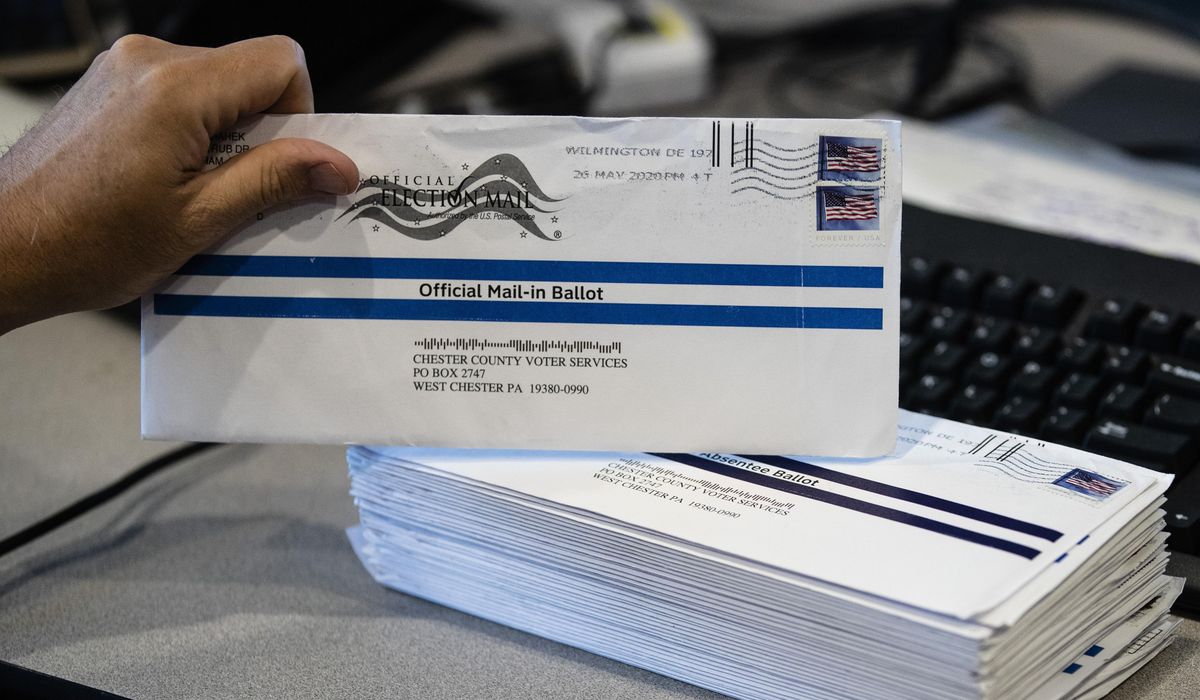More than 20% of voters who used mail-in ballots in Biden’s 2020 win say they engaged in fraud

A new survey made the startling discovery that 1 in 5 voters who used mail-in ballots in the 2020 presidential election admitted to committing some type of voter fraud.
In an election where about 43% of voters used mail-in ballots, which is the highest percentage in U.S. history, 21% told the pollsters they filled out a ballot, in part or in full, for a friend or family member.
That is illegal in all states.
The survey by the conservative Heartland Institute and Rasmussen Reports also found that 17% of mail-in voters said they voted in a state where they no longer lived permanently, and another 17% said they signed a ballot or ballot envelope for a friend or family member.
These acts are fraud and would cause the ballots to be invalidated if caught.
“The results of this survey are nothing short of stunning. For the past three years, Americans have repeatedly been told that the 2020 election was the most secure in history. But if this poll’s findings are reflective of reality, the exact opposite is true,” said Justin Haskins, the director of the Socialism Research Center at the Heartland Institute.
“This conclusion isn’t based on conspiracy theories or suspect evidence, but rather from the responses made directly by the voters themselves,” he said.
The survey bolstered opponents of widespread mail-in voting who say it is an invitation to election fraud.
Hans von Spakovsky, a senior legal fellow at The Heritage Foundation and the manager of the think tank’s Election Law Reform initiative, said that mail-in ballots are the “most insecure way of voting.”
“They are the only kind of ballot voted outside supervision of election officials, outside the observation of poll watchers, so there’s nothing to prevent individuals from being coerced or pressured to vote in a particular way,” he said. “There’s nothing to prevent them from — spouses for example — filling out their husband’s or wife’s ballot. And most states simply don’t have the kind of security provisions in place that would help deter some of this conduct.”
The poll also found that 10% of those surveyed, including those who didn’t vote by mail, said they knew someone who admitted to casting a mail-in ballot in 2020 to a state where he or she didn’t live permanently. And 8% said that a friend, family member or organization such as a political party offered some type of reward for agreeing to vote in the 2020 election.
Mr. von Spakovsky noted that the push for mail-in ballots has mostly come from the political left.
“Absentee or mail-in balloting used to be a very small percentage of voting, anywhere from 5 to 10% in most states, but there was such a huge push for it during the COVID pandemic and now it’s up to almost 50% of all votes are passed through the mail,” he said. “And it’s because there are a lot of people pushing this, and I think they’re making a mistake pushing it.”
No-excuse absentee or mail-in voting — as opposed to absentee voting for the infirm or Americans abroad — has become a partisan issue. Republicans warn that it threatens election security. Democrats laud it as expanding access to voting.
In the 2020 presidential election, 58% of voters who backed Democrat Joe Biden said they used mail-in ballots, compared with 32% of then-President Donald Trump’s voters who said they used mail-in ballots, according to Pew Research Center.
Mr. Trump railed against mail-in voting and discouraged his supporters from using it in the 2020 election.
Proponents of no-excuse mail-in voting argue that it makes voting more accessible and safeguards can prevent fraud.
Expanding mail-in voting across the U.S. was a part of House Democrats’ sweeping election overhaul bill passed in 2021. The effort died in the Republican-run Senate that year.
Rep. Jerry Nadler of New York, the top Democrat on the Judiciary Committee, didn’t back off his support of mail-in voting when confronted with the Heartland survey results. “People should vote legally, that’s all I can say,” he said.
Michael Toner, former chairman of the Federal Election Commission and a partner at Wiley Rein LLP, said mail-in ballots likely will be used less in 2024 than in 2020. But he said they will still be a “very important” part of campaigns.
“I think we’re going to see a sea change because the GOP has really decided they got to get with the program in terms of early voting and mail-in balloting because they weren’t nearly as active in encouraging their supporters to do early voting and mail-in balloting in 2020 as the Democrats,” he said. “And they really paid the price for that.”
He said Republicans will ramp up their messaging to get supporters to cast their votes before Election Day.
“There are still a lot of concerns among conservatives and conservative Republicans on the security of the mail-in ballot process, but it’s here to stay,” he said. “Once you give voters additional options on how they cast their ballots, it’s practically impossible to roll back those new avenues.”
James Taylor, president of the Heartland Institute, said that the survey results point to the “importance of implementing forward-looking fixes to election rules and procedures that currently allow and encourage fraud.”
“Regardless of what one’s views are on the outcome of the 2020 presidential election, Americans deserve an election system that is undeniably transparent and immune from mischief,” he said.
• Alex Miller contributed to this story.
This article has been archived for your research. The original version from Washington Times can be found here.

